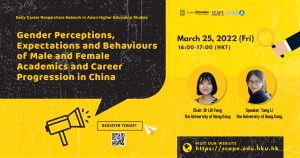Early Career Researchers Network in Higher Education Studies
Gender Perceptions, Expectations and Behaviours of Male and Female Academics and Career Progression in China
Speaker: Li TANG The University of Hong Kong
Chair: Dr Lili YANG The University of Hong Kong
Date: March 25, 2022 (Friday)
Time: 16:00-17:15 (HK Time) by zoom
Registration: Click here
Abstract
This article explores the experiences of male and female academics in China’s higher education system concerning career progression and examines how they perceive the challenges faced by the opposite gender. Our analysis of interviews with 40 academics from a research university revealed that academics’ experience of career progression is informed by gendered divisions of labour at home and work and by gendered role expectations that are prevalent in Chinese culture. Specifically, female academics reported performing a disproportionate amount of household work. In contrast, male academics mentioned great pressure to pursue promotion and career progression. Moreover, Male and female academics showed mixed comprehension of each other’s plight. We argue that the challenges faced by Chinese academics can only be mitigated if gender-specific promotion paths that recognise men’s and women’s social roles and obligations are made available.
Speaker
Tang Li, is currently a Ph.D. candidate at the Faculty of Education, University of Hong Kong. Her doctoral research investigates a holistic understanding of issues on Chinese women academics. She has strong interests in gender issues in higher education in China, with particular interests in career development of women academics. She has published in Higher Education and Higher Education Quarterly.
Chair
Lili Yang is an Assistant Professor at the Faculty of Education, the University of Hong Kong. Her research interests include higher education, cross-cultural comparison of higher education, and higher education policy. Her forthcoming book is titled ‘Higher Education, State and Society: Comparing the Chinese and Anglo-American Approaches’ (Bloomsbury).

